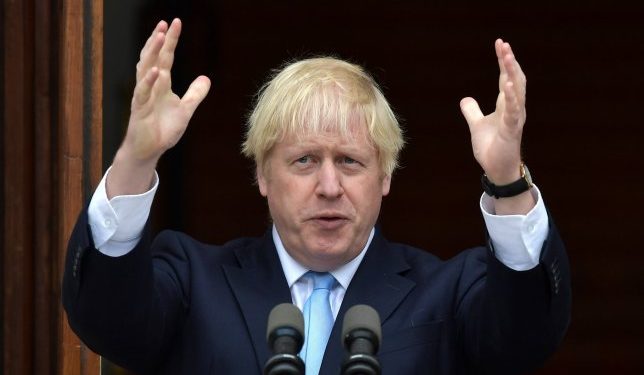London: The simmering showdown between Prime Minister Boris Johnson and Britain’s Parliament over Brexit came to a head as lawmakers delivered three defeats to the government’s plans for leaving the European Union.
In a session that ran well past midnight, Parliament enacted a law to block a no-deal Brexit next month, ordered the government to release private communications about its Brexit plans and rejected Boris Johnson’s call for a snap election to break the political deadlock.
Parliament was then suspended – or prorogued – at the government’s request until October 14, a drastic move that gives Johnson a respite from rebellious lawmakers as he plots his next move. Opponents accuse him of trying to avoid democratic scrutiny.
What is usually a solemn, formal prorogation ceremony erupted into raucous scenes as opposition lawmakers in the House of Commons chamber shouted ‘Shame on you’ and held up signs reading ‘Silenced’.
Commons Speaker John Bercow expressed his displeasure at Parliament’s suspension. “This is not a standard or normal prorogation. It’s one of the longest for decades and it represents an act of executive fiat,” said Bercow.
The prime minister has had a turbulent week since Parliament returned from its summer break September 3. Boris Johnson kicked 21 lawmakers out of the Conservative group in Parliament after they sided with the opposition, and saw two ministers quit his government – one of them his own brother.
Parliament’s suspension ended a day of blows to the embattled Johnson.
First an opposition-backed measure designed to stop Britain from crashing out of the EU, October 31 without a divorce deal became law after receiving the formal assent of Queen Elizabeth II. The law compels the government to ask the EU for a three-month delay if no deal has been agreed by October 19.
Johnson said the country’s delayed exit must happen at the end of October, with or without a divorce agreement to smooth the way. But many lawmakers fear a no-deal Brexit would be economically devastating, and are determined to stop him. “I will not ask for another delay,” Johnson said. But he has few easy ways out of it.
Johnson’s options – all of them extreme – include disobeying the law, which could land him in court or even prison, and resigning so that someone else would have to ask for a delay.
Then, early Tuesday, lawmakers rebuffed, for a second time, Johnson’s request for an early election, which he said was ‘the only way to break the deadlock in the House’.
Opposition parties voted against the measure or abstained, denying Johnson the two-thirds majority he needed. They want to make sure a no-deal departure is blocked before agreeing to an election.
“We’re eager for an election, but as keen as we are we, we are not prepared to inflict the disaster of a no deal on our communities, our jobs, our services, or indeed our rights,” Labour Party leader Jeremy Corbyn said.
It should be stated here that Johnson had earlier acknowledged Monday that a no-deal Brexit ‘would be a failure of statecraft’ for which he would be partially to blame.
AP






































